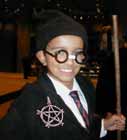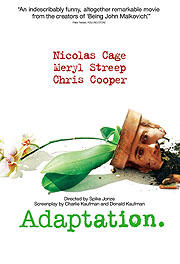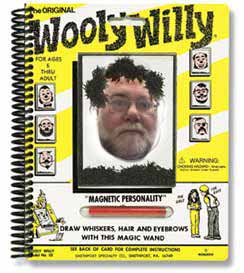June 13, 2003- It's Friday the 13th

I are Ephesians.
Which book of the Bible are you?
brought to you by Quizilla
June 13, 2003- It's Friday the 13th
| And the squirrels are experiencing bad luck. |  |
 |
Wiccan group says Potter books boost interest in
witchcraft.
Thanks to Larry for this link. This is the first documentable(?) assertation
I'ver seen along these lines. Here's a NY Post article. And a response from a Wicca to a Mormon for good measure. Here's what another Wiccan had to say. Richard Abanes makes some good points. And finally, a review of Francis Bridger's book A Charmed Life by a trusted voice...check out the link. |
June 12, 2003 Belated Movie Review
Adaptation is a film that almost defies review. One reason I saw the movie was the encounter I had with reviews of the movie I read online-it seems every review is of a different film. The enigmatic, self referential quality of the film reads like a joke being played on the audience.
First the film references real life characters that are convolved into a plot around the adaptation of an unadaptable book into a screenplay. The movie becomes about the quest to resolve the irresolution of this problem. So early on one must act is this a dream or a dream of a dream? The adaptation of the book becomes a metaphor of how humans attempt to adapt to the irresolution and confusion and percieved meaninglessness of life.
In the end, fiction wins out over non fiction as the angst and self loathing of Charlie Kauffman give way to a theatre of the absurd with characters initiating contrived actions to satisfy the screenwriter's need for climax and denouement. He adapts reality to suit the contrivance and trivializes the real life characters in the process.
I see the main them of the movie reflected in Susan Orleans's statement about how everyone needs that one passion that drives their lives. The movie confuses passion and obsession..
Another esoteric theme that arises derives from the debate over adaptation versus translation in the discipline of hermeneutics. Which is truer to reality?
|
Choices in life seem to boil down to
|
 |
Once Charlie determines to sacrifice the adaptation of an unadaptable non fiction book for the pursuit of an interesting story that will sell, all bets are off. Susan Orleans fascination with the Orchid theif’s passionate pursuit for the sake of passion gives way to an enactment- she becomes involved in pornography, drugs, and eventuially seeks to murder the screenwriter to preserve her secrets. It is not exactly evident that this is what is acrually happening in the movie, but reflection demands this conclusion.
Charlie Kaufman's life on screen includes a twin brother who he at once loves and hates. The real life Charlie has no brother. Donald the alter ego gives balance to Charlie's life and in the end is sacrificed on the altar of the plot. So much is invented to satisfy the march of the plot to it’s sad end and even Laroche ends up being eaten by a gator.
 |
Which brings me to one of the key metaphors of the movie- LaRoches's tattoo- an ouroborus- (BTW- that's Dana Scully's tattoo of X-Files as well) or snake eating it's own tail- an ancient gnostic symbol of eternity and self knowledge. |
I think this ties into the cosmological construct of the pelastrating universe as a theory of how knowledge is stored and retrieved. Charlie's search and lack of discipline is a picture of this- he is extremely self consumed, examining his own motives and character ad infinitum. The theme of pursuit of passion without meaning keys into this.
| Simulation of what Chris Cooper might look like in a Klein Bottle Hat. Get yours here. |  |
Even the ending of the movie reflects the primitive idea of a self-sufficient Nature - a Nature, that is which, as in Nietzsche, continually returns, within a cyclic pattern, to its own beginning. Charlie is satisfied and finds hope in the neat resolution he has for the problem he was originally presented with, but one wonders how long this hope will last since it is found in his own ability to manipulate words on a page.
June 10, 2003 Blog on the Fritz
Some of last week's files got overwritten due to a bad naming convention- will fix soon as possible...
"In tonight's news, a ship carrying red dye collided with a ship carrying brown dye. Crew and passengers were marooned."
 |
Mo' Betta than Minoxydil? More radical than Rogaine? |
C.S. Lewis on likeness to Christ
Our imitation of God in this life -- that is, our willed imitation, as distinct from any likenesses which He has impressed upon our natures or our states -- must be an imitation of God Incarnate. Our model is the Jesus, not only of Calvary, but of the workshop, the roads, the crowds, the clamorous demands and surly oppositions, the lack of all peace and privacy, the interruptions. For this, so strangely unlike anything we can attribute to the divine life in itself, is apparently not only like, but is, the divine life operating under human conditions. ... C. S. Lewis (1898-1963), The Four Loves
A week's notice so you can find an appropriate gift...
| Wesley's Birthday-John Wesley was born on 17 June 1703 ('old style' calendar - or 28 June in the 'new style' calendar after 1752). |  |
Another Parable by Kierkegaard
Once there was a man who never turned a light on when he entered a room. When asked why, the man said " I'm just going to retrieve a trifle, I don't need a light". And no one thought anything of it. But one day the man confided that he was searching for something of utmost importance. When friends suggested that he carry a light, he didn't feel the need for it. And so he never found what he was looking for. Once there was a town with many beautiful mansions. The mansions were so designed that each had a cellar, a ground floor and a first floor. They were arranged so that one could distinctly see that there was a ranking to be associated with the dwellers on each floor. The majority of the townspeople preferred living in the cellars. They found pleasure in the cellar. They never had to climb stairs, and they filled their cellars with all the things they could find in order to keep their needs met. One day a young man, who was accustomed to living in the upper levels of his mansion came to a town meeting. Hr posed the question as to why most of the people preferred living in the cellar of their mansions when the whole house was at their disposal. The townspeople became furious at this- for anyone to be audacious enough to propose that they should do things differently that to what they were used to- for in fact, they were dwelling in their own houses! The townspeople, then furious, reacted to this impertinence by running the young man out of town.